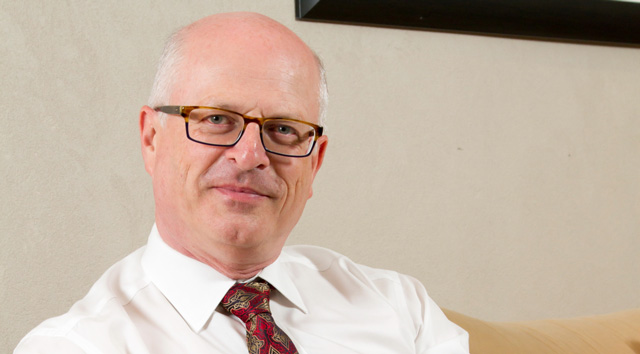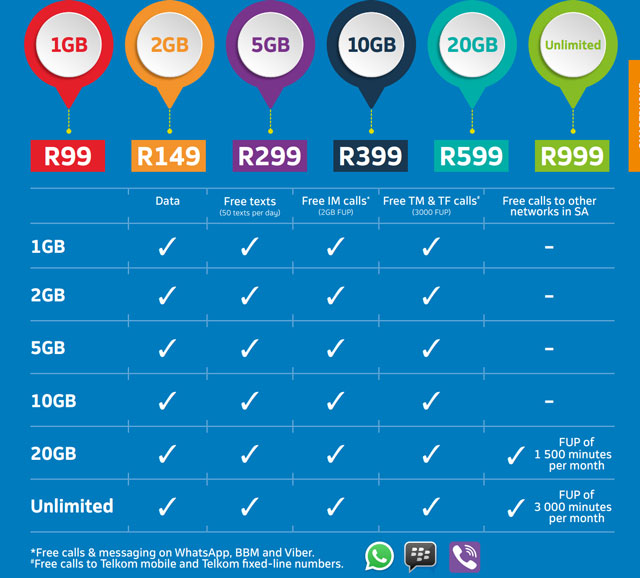
Let’s accept the point of departure: mobile contract packages are broken. There are too many bundled voice minutes hardly anyone depletes and an infinitely higher number of completely useless SMSes. Data bundles are almost an after-thought (and inadequate), despite being, effectively, the primary method of consumption when it comes to smartphones. Telkom has a plan to fix that, and it’s started at a very obvious place (to the rest of us, at least): data.
Telkom’s new FreeMe plans, announced in Hyde Park in Johannesburg on Thursday night, start with large data bundles at the core. Added to that are free (voice-over-Internet protocol) calls on WhatsApp, Viber and BlackBerry Messenger (BBM) — that is, the data used on these calls won’t be deducted from your bundle — plus free SMSs and free calls to Telkom numbers, both mobile and fixed line. At the upper end of the six packages, there are bundled (free) calls to other networks as well. Voice calls are a flat 69c/minute (to other networks) and out-of-bundle data is 29c/MB.
Pricing is very aggressive, with the entry-level plan of 1GB/month costing R99. At the top end, an “unlimited” plan (with a fair-use policy of 25GB) is R999. (See the full package details here.)
The fair use policies across the plans are probably the result of lawyers getting involved, but honestly you’d be hard-pressed to hit any of these limits. The SMS limit equates to 1 500/month, the limit on calls on WhatsApp, Viber and BBM translates to about 4 000 minutes, and no one dials enough Telkom numbers (mobile or otherwise) to hit a 3 000-minute a month cap (there are “only” 40 000-odd minutes in a month). And, if you’re exceeding either 1 500 or 3 000 minutes of calls to other networks per month, your bill is comfortably running into thousands of rand anyway.
Where Telkom has certainly missed a trick is on the “unlimited” package. Hidden in the fine print is the fair-use policy of 25GB/month (after which you’re throttled to 128kbit/s). This is high but not much higher than the 20GB plan. Should you really be paying two-thirds more per month for an extra 5GB and double the amount of off-net calling minutes?
To make this package attractive, given that the entire proposition is centred on data, the fair-use limit should’ve been significantly higher — something like 50GB/month. Wisely, and justifiably, torrent or peer-to-peer traffic is automatically throttled across the board at 128kbit/s on the unlimited plan.
Obviously, the pricing above would still need a device cost to be added (in other words, they’re Sim-only). For example, an iPhone 6 (16GB) would be R399/month or a Samsung Galaxy A3 would be R299/month.
The operator has also pushed hard to eliminate the distinction between contract and prepaid customers (and price plans): FreeMe packages are available on post-paid (normal contract), top-up and prepaid. Post-paid (and top-up) will run as normal: on calendar months. For prepaid, the bundles will be valid for 31 days.
But why has Telkom made this move?
CEO of Telkom’s consumer and small business division, Attila Vitai, said this is a fundamental rethink that is is grounded in “lots of research” and that — importantly — it has “listened” to what customers actually want. Younger customers, particularly, are “surprised that anybody would use an ordinary GSM voice call” and he counts his own children among them.
Truthfully, Telkom — in its position as challenger operator — can afford to make these bold moves. It has 2% to 3% market share, “growing very fast, but from a very low base”, said Vitai. It has to give people a “compelling reason to switch” and although it has achieved traction in the market (its financial results for the year to end March prove that), its ambitions are “much greater”.
Vodacom and MTN’s larger subscriber bases mean that a far greater percentage of their calls are on-network than off-network (compared to smaller operators Cell C and Telkom). Even with mobile termination rate changes, argued Vitai, there is still that inherent disadvantage when looked at from a position of single-digit market share.
“This makes it difficult to price aggressively. But people, increasingly, don’t actually use voice calls anymore.”
And so, data.
But, to make sure its network was capable of carrying all this data, for which there is pent-up demand, it had to re-farm its 1,8GHz spectrum, which was “very much underutilised”. A few hundred thousand customers were using it for 2G voice, said Vitai, which meant it was very “expensive” spectrum to maintain. It’s been actively re-farming that from voice to 4G/LTE data, and is now in a position to “offer millions of customers big bundles of data to run over this network”.

The operator has had a few dozen people working on these products for the past six months, and Vitai said matter-of-factly that this is the “best new product launch within Telkom” that he’s seen during his four years at the operator.
Chief marketing officer Enzo Scarcella said there’s a broader plan with the FreeMe proposition being “extended into other product categories” (think fixed line), with a few more announcements to come later this year and early next.
One might dismiss Vitai’s resolute belief that this is “going to change the face of the industry” as mere marketing hype. But it’s hard to see how it won’t.
Vodacom, MTN and Cell C are going to have to react, and there are quiet murmurings that we’ll see movement soon.
Vodacom’s Smart and Red integrated plans are more than four years old. And while they might have had “enough” bundled data when they were launched in 2012, the amounts are woefully and obviously inadequate in 2016.
This will explain why it relatively quietly launched “Smart More Data” contracts earlier this year. Similarly, MTN launched My MTNChoice+. But all this has done is create even more complexity in a market both have tried to simplify (MTN with market-leading AnyTime in 2008 and Vodacom’s Smart/Red four years later). There’s simply been too much sustained pressure from both Cell C and, now, Telkom.
“FreeMe will change usage habits, usage patterns and pricing,” maintained Vitai.
It will. And that’s a good thing.
- Hilton Tarrant works at immedia. He owns shares in Vodacom, first purchased in June 2013
- This article was first published on Moneyweb and is used here with permission




